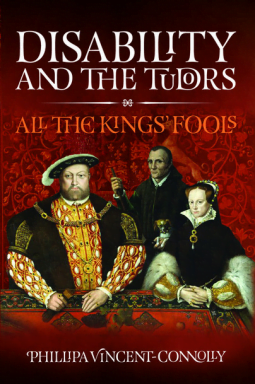
Throughout history, how society treated it’s disabled and infirm can tell us a great deal about the period. Challenged with any impairment, disease or frailty was often a matter of life and death before the advent of modern medicine, so how did a society support the disabled amongst them? For centuries, disabled people and their history have been overlooked. Very little on the infirm and mentally ill was written down during the renaissance period. The Tudor period is no exception and presents a complex, unparalleled story. The sixteenth century was far from exemplary in the treatment of its infirm, but a multifaceted and ambiguous narrative emerges, where society’s ‘natural fools’ were elevated as much as they were belittled.
Meet characters like Will Somer, Henry VIII’s fool at court, whom the king depended upon, and learn of how the dissolution of the monasteries contributed to forming an army of ‘sturdy beggars’ who roamed Tudor England without charitable support.
From the nobility to the lowest of society, Phillipa Vincent-Connolly casts a light on the lives of disabled people in Tudor England and guides us through the social, religious, cultural and ruling classes’ response to disability as it was then perceived.
I seemed to spend the entire of my childhood learning about The Tudors. My school taught me about the wars, the marriages, the Mary Rose, and all sorts of things. But, it turns out, they missed out a hell of a lot. Much like Miranda Kaufmann's "Black Tudors: The Untold Story" - this book uncovers some incredible details about hidden history. In this case, the author takes us through the Tudors' ideas of, and attitudes to, disability.
You can look at history through any lens. Intersectionality teaches us how various groups have intertwined (and sometimes disharmonious) needs. Both physical and mental disability can mark a person as an outsider - in the same way that race, or class, gender, or religion determines your status in society. Understanding how the UK's culture has evolved gives us a way to view our modern society.
Indeed, the arguments about the welfare state and "undeserving" poor which dominated Tudor society still continue to this day. History doesn't repeat - but it sure does rhyme!
Due to the lack of documentation outside of high society, the book is dominated by the royal family. It is interesting to hear about how Henry Ⅷ needed a wheelchair towards the end of his life - and even had an early stairlift installed in Hampton Court! - it does provide a somewhat limited view. Is infertility a disability? Perhaps if you are a monarch and are expected to provide an heir, it is. But it doesn't tell us much about the lives of "ordinary" people maimed in war, or forced to survive in a world which wasn't built for them. That said, there's an interesting discussion around Shakespeare and the social model of disability.
From a professional perspective, there was a fascinating look at the Elizabethan data collection exercises to count the poor. The book co-mingles the idea of poverty and disability. Again, due to lack of documentation, attitudes to poverty is probably a reasonable lens through which to view the lives of disabled Tudors.
There are a few non-nobles we get to meet - Will Somer and Jayne Fool - their closeness to the Royal Court means that details of their lives are well-evidenced. We get an amazing glimpse into social attitudes around them. Far from being seen as a burden - they were valued members of the household.
The book is a good general overview of a rarely-explored slice of history. But, sadly, it isn't without its flaws. It really would have benefited from illustrations. We get lots of descriptions of paintings - but you need to head to Wikipedia if you want to examine them yourself. The structure is also somewhat confusing - it jumps back-and-forth between Kings and Queens - so you'll need a solid grasp of history to keep it all straight.
Because of the way it bounces betweens themes, it is a little bit repetitious. There are lots of reused quotes - sometimes within the same chapter. So it ends up feeling a little bit scattershot.
That said, it really brought home to me just how poorly history is taught in this country. I had no idea that dissolution of monasteries had such a calamitous effect on the lives of disabled people living there. Nor that "natural fools" (to use the historic parlance) were held in such high esteem. Incidentally, the book uses contemporary language throughout - which can come as a bit of a shock in these somewhat more enlightened times.
It is a worthwhile - and worthy - book. Perfect for anyone who thinks the commonly-taught, rose-tinted view of Tudor society tells the whole story.